| Introduction
Holy Land Photo Album
Maps of Israel
Genesis
Genesis Part 2
Exodus
Exodus Part 2
Leviticus
Appointments with YAHWEH
A Place for YAHWEH's Name
|
|
How would you feel if you were invited to an appointment with the Creator Himself?
You would consider it very important, wouldn't you? You would make every effort to be on schedule and not miss a detail of how He wanted you to dress and behave. But the truth is, you have been invited to not just one, but many appointments with Him!
Today we are used to the Roman calendar and its holidays. But our Creator, whose name is Yahweh, set up a different calendar long before ours existed. He built into it repeating themes so that the same type of thing happened several times on the same date.
For example, both Solomon's and Herod's Temples were destroyed on the same day of the year, the ninth of Av. On a happier note, Noah's ark came to rest on the very same day of the year that the waters of the Red Sea buried Pharaoh's army, and the same date on which Haman was exposed and condemned in Queen Esther's time. They all picture deliverance. There is a special reason for this. The day they fell was on the 17th of Aviv (also called Nisan), a day Yahweh had a very special appointment with His people.
At Mt. Sinai, Yahweh commanded Israel to appear before Him at certain "appointed times" on which there were to be "rehearsals" of great events that would happen later in history on those very days on His calendar.
He gave these festivals in two sets. The first set falls in the spring:
SPRING FESTIVALS:
14th of 1st Month: Passover (Peasch)
15th-21st of 1st month: Feast of Unleavened Bread
Day after the Sabbath following Passover: Firstfruits of the Barley Harvest
(Begin “Counting the Measure”)
7 weeks later on 1st day of the week: Shavuoth (Feast of Weeks/Pentecost/Firstfruits of Wheat Harvest)
|
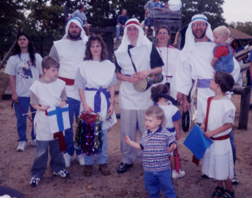 Passover is the First Festival of the Year
It also begins the seven-day Feast of Unleavened Bread.
Passover is the First Festival of the Year
It also begins the seven-day Feast of Unleavened Bread.
In our own day, we are also coming out of Egypt as the whole nation of Israel is being reassembled from among all nations in the world.
The year begins at the the new moon when the barley crop has reached a stage of ripening called "aviv". At creation Yahweh had said the sun, moon, and stars were created for signs and "appointed times", this same Hebrew word for the festivals. So we must watch the signs He gave in the heavens to know when the festival seasons begin. And studying Yahweh's patterns in agriculture teaches us about bearing spiritual fruit as well. Once these two signs come together, Passover will be at the next full moon, the 14th of the month also called Aviv.
Passover is the day when Yahshua was crucified, and with the unleavened bread, which represents sinlessness, and wine which represented His blood, He renewed the covenant and made it possible for Yahweh to "pass over" our sins.
The day after the Sabbath that follows Passover is called the Firstfruits of the Barley Harvest. Do you remember anything else that happened on the Sunday after Passover? It was the day that the Messiah--whom Paul calls the "firstfruits of them that slept" (I Cor. 15:20)--rose from the grave! And since we know he was in the grave for three days and three nights, that day had to be the 17th of Aviv, the day Yahweh had accomplished those other amazing examples of deliverance that we saw above. |
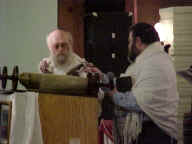 Shavuoth (Pentecost) celebrates
Shavuoth (Pentecost) celebrates
the giving of the Torah at Mt. Sinai.
Firstfruits begins a countdown of seven weeks, culminating in the "Feast of Weeks" (Shavuoth), when the wheat crop would be ready, and, by tradition, when the ten commandments were given. Shavuoth is known in Greek as Pentecost, when Messiah Yahshua's disciples were endowed with great fruitfulness, also after a period of waiting.
So He kept every one of the first set of appointments on its very day. But He has not yet fulfilled the latter set of feasts that come after a long gap:
FALL FESTIVALS:
1st day of the 7th month (Ethanim): Yom T’ruah
(Feast of a Shout or Trumpet Blast)
10th of Ethanim: Yom Kippur (Day of Atonement)
15th-21st of Ethanim: Sukkoth (Feast of Booths or Tabernacles)
|
 Yom Truah -- the Day of Trumpets
Yom Truah -- the Day of Trumpets
Jewish scholars have long associated the Feast of Trumpets with the resurrection of the dead. So there is another "season of fulfillment" that will occur upon His second coming. The Day of Atonement foreshadows "judgment day". |
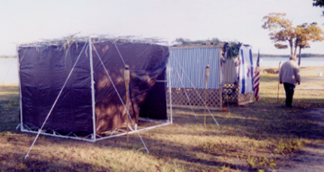 Sukkoth (the Feast of Temporary Shelters)
is a forestaste of the Messianic Kingdom. It was one of the three pilgrimage festivals when every able-bodied male was required to come to Jerusalem. The city was not very big (just over a square mile), so many people would spill over into the suburbs, including Bethlehem, only five miles away. This explains why there was no room in the inn when Y'shua was born, because many details of Sukkoth point to it as being the real time He was born. Joseph would combine the trip to Bethlehem for the census with his necessary journey for the festival.
Sukkoth (the Feast of Temporary Shelters)
is a forestaste of the Messianic Kingdom. It was one of the three pilgrimage festivals when every able-bodied male was required to come to Jerusalem. The city was not very big (just over a square mile), so many people would spill over into the suburbs, including Bethlehem, only five miles away. This explains why there was no room in the inn when Y'shua was born, because many details of Sukkoth point to it as being the real time He was born. Joseph would combine the trip to Bethlehem for the census with his necessary journey for the festival.
A sukkah (singular) is traditionally to have gaps in the roof big enough to see stars through--foreshadowing the "star of Bethlehem". Shepherds would not have sheep out in their fields during December, but would still have them there during Sukkoth, just after the harvest. The angel told them he had good news of great joy. Sukkoth is nicknamed "the season of joy", and emphasizes the cleansing of all nations from their sins.
|
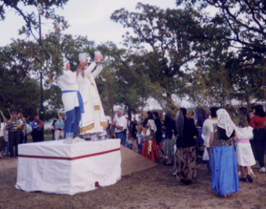 Simkhat Torah, the Last Day of Sukkoth
Simkhat Torah, the Last Day of Sukkoth
It was on the final day of Sukkoth, during a special ceremony in which water and wine were poured over the Temple altar, that Yahshua offered living water to any who were thirsty. (John 7) There were four great lights in the Temple used only on this occasion. They were called "the Light of the World"--a title Yahshua specifically applied to himself.
So it is obvious that everything He said and did was set by this calendar. If we return to the feasts Yahweh prescribed, not only do we lose nothing of any value that was in the other holidays which are mostly pagan; instead, we learn much more than ever about Yahshua. These feasts make more sense out of so much of what he said. In His mercy Yahweh is restoring them in these last days so we can prepare for the Kingdom, when Zechariah 14 says all nations will be required to come to
Jerusalem for Sukkoth--or they won't get any rain that year!
|
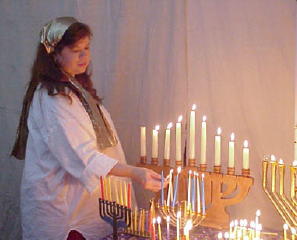 Hanukkah, the Feast of Dedication
Hanukkah, the Feast of Dedication
With one light added to our menorah (candelabrum) each of the eight nights, we remember the time when pagans sacrificed a pig on the holy altar, and the Jews fought for three years to get the Temple back and dedicated the new altar on this date. You can read about it all in the Book of Maccabees, which is not part of the Bible, but is true history. |
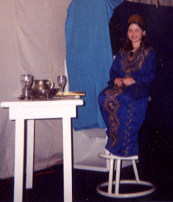 On Purim, we dress up
On Purim, we dress up
like characters in the book of Esther.
It's a day of a lot of fun, but it recalls a time when the existence of all the Jewish people was threatened, and Yahweh saved the day through Queen Esther and her Uncle Mordechai.
You don't have to be Jewish to celebrate these last two feasts. They recount things that Yahweh, the Elohim of all Israel, did to preserve His people and their ability to obey Him, and teach us how to be more dedicated to Him. |
|
|


